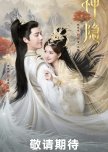Review and Analysis of The Last Immortal and Its Impact in the Xianxia Genre
I've been thinking about how to approach the review of this drama. I don't want to describe the plot here, so I'll focus only on certain facts.
Th Last Immortal is a drama that was the first xianxia drama I really enjoyed. It can be said that it opened the door to this genre for me. Why is that? Because Last Immortal was very refreshing for me; the drama flowed nicely, and I enjoyed every second of it. There's no need to talk about the acting performances – Zhao Lusi is already a good actress, and Wang An Yu, along with the others, complemented her very well.
Regarding the storyline, as I have already written, everything was understandable to me, though towards the end, I would have liked more twists.
I really appreciated and enjoyed the costumes and hairstyles, which reflected the different phases of the characters well, from the playful and childish A Yin to the brattish, spoiled Gu Jin. As the characters developed, the hairstyles and costumes were, of course, appropriately adjusted.
Below, I focused on four parts and selected three main key points from each. This doesn't mean that I couldn't find more points in some areas, but I wanted to highlight only the key ones.
The main strength of both dramas is exceptional acting performance. In particular, Zhao Lusi and Wang An Yu are outstanding in their roles and significantly contribute to the success of these series. The stories of both dramas are captivating and unfold in richly created worlds, with deep and interesting characters. The visual aspect, including costumes and hairstyles, adds to the authenticity and immerses viewers in the story. Additionally, The Last Immortal builds on the previous work "Ancient Love Poetry," which expands the fan base and opens new horizons in the xianxia genre.
Despite their strengths, these dramas also have some weaknesses. TLI is strongly linked to ALP, which might be an obstacle for some ALP fans, as it might not have met their expectations for the drama's development. In some parts of TLI, there may be a lack of complexity and depth in the story, which some viewers might consider a shortcoming. Differences between the book and the TV adaptation can also deter some fans.
The drama offers a number of opportunities for further development. There is great potential to attract new viewers, especially those who are not yet familiar with the xianxia genre. The interest in the characters and the story offers an opportunity for modern adaptations, which could appeal to a wider audience and bring new dimensions to the genre.
TLI faces competition within the xianxia genre, which is full of similar themes. High expectations from fans and comparisons with classic works of the genre can be a challenge. The ending of "The Last Immortal" evoked mixed reactions among viewers, which can affect the overall impression and recommendations. For some viewers, the end of the drama might be a challenge or an opportunity for another sequel.
Th Last Immortal is a drama that was the first xianxia drama I really enjoyed. It can be said that it opened the door to this genre for me. Why is that? Because Last Immortal was very refreshing for me; the drama flowed nicely, and I enjoyed every second of it. There's no need to talk about the acting performances – Zhao Lusi is already a good actress, and Wang An Yu, along with the others, complemented her very well.
Regarding the storyline, as I have already written, everything was understandable to me, though towards the end, I would have liked more twists.
I really appreciated and enjoyed the costumes and hairstyles, which reflected the different phases of the characters well, from the playful and childish A Yin to the brattish, spoiled Gu Jin. As the characters developed, the hairstyles and costumes were, of course, appropriately adjusted.
Below, I focused on four parts and selected three main key points from each. This doesn't mean that I couldn't find more points in some areas, but I wanted to highlight only the key ones.
The main strength of both dramas is exceptional acting performance. In particular, Zhao Lusi and Wang An Yu are outstanding in their roles and significantly contribute to the success of these series. The stories of both dramas are captivating and unfold in richly created worlds, with deep and interesting characters. The visual aspect, including costumes and hairstyles, adds to the authenticity and immerses viewers in the story. Additionally, The Last Immortal builds on the previous work "Ancient Love Poetry," which expands the fan base and opens new horizons in the xianxia genre.
Despite their strengths, these dramas also have some weaknesses. TLI is strongly linked to ALP, which might be an obstacle for some ALP fans, as it might not have met their expectations for the drama's development. In some parts of TLI, there may be a lack of complexity and depth in the story, which some viewers might consider a shortcoming. Differences between the book and the TV adaptation can also deter some fans.
The drama offers a number of opportunities for further development. There is great potential to attract new viewers, especially those who are not yet familiar with the xianxia genre. The interest in the characters and the story offers an opportunity for modern adaptations, which could appeal to a wider audience and bring new dimensions to the genre.
TLI faces competition within the xianxia genre, which is full of similar themes. High expectations from fans and comparisons with classic works of the genre can be a challenge. The ending of "The Last Immortal" evoked mixed reactions among viewers, which can affect the overall impression and recommendations. For some viewers, the end of the drama might be a challenge or an opportunity for another sequel.
Considerați utilă această recenzie?





